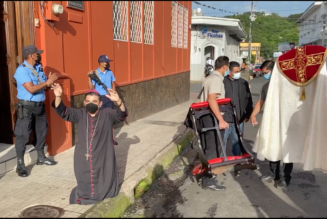
Learning that only one-third of American Catholics believe that the Eucharist is the body of Christ, the U.S. Catholic Bishops issued “The Mystery of the Eucharist in the Life of the Church” this past November.[1] Even devout and knowledgeable American Catholics, though, may be surprised by what the bishops spend nine sections explaining—that the Eucharist animates work for justice.
After the bishops recount that the Eucharist is an act of worship and thanksgiving (what American Catholics will find most familiar) they teach that people conformed to the Eucharist “[reach] out to every sphere of Christian life” and “[reshape] the life of our society.” Such people love the poor in particular, in whom, like Mother Theresa, they find Christ.[2]
Tightening the bishops’ insight will be the yet more surprising claim that the Eucharist is not simply strength, inspiration, or instruction for justice; rather, the Eucharist is justice. Should the claim prove true, the Eucharist is all the more potent for transforming the world and points to a new politics. Pope Benedict XVI sounded this potential through one of the most vivid and unexpected metaphors through which anyone has described the Eucharist:
The substantial conversion of bread and wine into his body and blood introduces within creation the principle of a radical change, a sort of “nuclear fission,” to use an image familiar to us today, which penetrates to the heart of all being, a change meant to set off a process which transforms reality, a process leading ultimately to the transfiguration of the entire world, to the point where God will be all in all (cf. 1 Cor 15:28).[3]
Nuclear fission as we’re remembering once more lives little intact.
The Eucharist is justice: Is this going too far? It will be seem jarring to people in the West, whose dominant concept of justice is one that was incubated in Roman Law, enshrined in the Christian tradition by St. Thomas Aquinas, and passed down into contemporary times: the constant will to render another his due. Justice, it will be said, is people fulfilling their contracts, workers receiving rightful compensation, minorities being free from wrongful discrimination, the poor not getting cheated, and convicted criminals paying their debts to society.
Due means rights. People receive their due when their right not to be tortured, insulted, or arbitrarily detained is respected and when their right to be provided the money that is owed them, an education, and safe working conditions is fulfilled. With respect to past wrongs, due means retribution: Wrongdoers receive their due when they are punished for their misdeed. Is not the body and blood of Jesus Christ something different?
Should there prove a connection between justice and the Eucharist, it would be found where the Eucharist is described, the Bible. The fathers of the Second Vatican Council called for a greater use of the Bible as a source for morality.[4] To English readers, the meaning of justice in the Bible is usually hidden behind the more familiar word, righteousness. Seek first the Kingdom of God and his righteousness (Matt 6:33) is known to every Christian teenager who has sat around a bonfire at camp. In the words of Jesus, righteousness is also that for which it is blessed to be persecuted and that for which the blessed hunger and thirst (Mt 5:6). In the Psalms, righteousness kisses peace (Psalm 85: 10). The Apostle Paul writes of the righteousness of God in his Letter to the Romans (Rom 3:21-26). In most English translations of the Bible, justice is far less prominent.
A tradition exists, however, of translating as justice the words that are rendered as righteousness. This is the tradition of Latin, the language that contains the root for the English word justice, but none for the English word righteousness, whose root is Germanic. In the Vulgate, the historically influential Latin translation of the Bible, the words that appear in English Bibles as righteousness appear instead as iustitia or a close variant. Great theologians such as Saint Gregory of Nyssa, Saint Augustine, and Satin Thomas Aquinas incorporated the Vulgate’s munificent use of justice into their writings. Bibles in Latin-based languages such as French, Spanish, and Italian will render the same words as justice, justicia, and giustizia, while the English Douay-Rheims Bible, which was translated from the Vulgate, renders them as justice. Think, then: Seek first the kingdom of God and his justice.
In this tradition, then, justice is far more prominent in the Bible and embodies the meaning of the original words that it translates. What are these words and what do they mean? In the Old Testament, the word is most often the Hebrew sedeq (or its feminine variant, sedeqah), which appears hundreds of times and carries a wide range of meanings but also an overarching definition: comprehensive right relationship. This includes the relationship that God establishes with humans and the totality of obligations that humans have towards God and one another. In the Septuagint, the second century BC translation of the Bible into Greek, sedeq is translated by dikaiosune, a word that then appears in the New Testament, where it also means comprehensive right relationship.
Can we say definitively that these words ought to be translated as justice rather than righteousness? No, both English words in their own way fall short of conveying the comprehensiveness of sedeq and dikaiosune. Righteousness tends to connote personal probity, while justice has come to mean what is public, legal, and juridical. Yet English also contains usages of justice that approximate holism, as found, for instance, in the writings of “care” feminists, the restorative justice movement, and translations of Plato and Aristotle. By choosing justice to translate these terms in the Bible, we gain a biblical vision of that virtue which philosophers ranging from Aristotle to John Rawls have thought to be the primary one of public life.
The meaning of the Bible’s justice unfolds over the course of its story. In many instances, justice is an action that God performs. In the Psalms, justice often describes God’s establishment and upholding of moral order—comprehensive right relationship. Justice also describe God’s restoration of right relationship between himself and humanity in the aftermath of sin. In Second Isaiah, sedeq means the “saving justice” through which God restores the Israelites after their exile in Babylon. In the Letter to the Romans (3:21-26), Paul employs the “justice of God” to describe God’s salvation of the world through cross and resurrection. The Apostle Peter (2 Pet 3:13) uses justice to describe the new heavens and new earth where this restoration of right relationship has been completed.
Here lies the connection between justice and the Eucharist. The body and blood of Christ, present under the sacramental signs of bread and wine, are the divine action that represents to people Christ’s sacrifice, the work of the cross and resurrection, though which God restores right relationship between himself and humanity—the saving justice of the Bible.
Here, too, can be seen the contrast between biblical justice and the justice of rendering due. Biblical, or Eucharistic, justice does not reject what is due but rather enfolds and exceeds it. Numerous metaphors for Christ’s saving action in the New Testament connote the rendering of due: acquittal, debt for sin, expiation, and ransom. Yet, Paul also insists that this same action is a “gracious gift” that God bestowed “while we were still sinners,” meaning that God did not give humanity its due. In God’s strange justice, God graciously renders what is due on behalf of those who owe what is due but cannot pay it. The same justice restores sinners to right relationship within their souls, with others, and with God.
In the Bible, God not only enacts justice but also communicates justice as a law for human beings to enact. In the Old Testament, sedeq often means the entirety of the laws that God revealed in his covenants, most importantly the laws he gave to Moses on Mount Sinai. In the New Testament, dikaiosune means Jesus’s teachings about how to live, most importantly the New Law that he gave on the Sermon on the Mount. Jesus exemplifies this justice most fully in the cross and resurrection and prescribes this justice as the form of the Christian life when he teaches “take up your cross and follow me.” The justice that the Bible commends for the life of the Christian, then, is the entirety of right relationship with others and God, including the gift of oneself, all of which is a life configured to the Eucharist, or Eucharistic justice.
As carried out by Christians, Eucharistic justice again involves both rendering what is due and giving beyond what is due. In important respects, giving what is due characterizes the Christian life. The Christian owes everything to God in worship and thanksgiving. Christian morality also enfolds respect for natural rights, which, although they are explicit in the Bible, reason apprehends and the Magisterium of the Church forthrightly affirms. Nor do scripture or subsequent Church teaching dispense with the core retributive claim, that wrongs merit adverse consequences. Due is not voided.
The Bible’s justice, though, also involves generosity, mercy, solicitude for the poor and the stranger, hospitality, and sacrificial love, and, towards past wrongs, love for enemies and reconciliation, all of which involve giving to others in excess of what they are owed, have a right to, or had coming to them. Jesus’s command to forgive exceeds what is due pointedly, for it is precisely our debts—that which is owed, that we are told to forego (Matt 6:12). Often in the Bible, God commands his followers to give more than what is due—to be merciful, forgive, welcome the sojourner—on the premise that he first gave his followers more than what is due—mercy, forgiveness, freedom from foreign captivity.
Eucharistic justice, in short, is the comprehensive right relationship that God established and willed to restore through the death and resurrection of Jesus Christ, and in which Christians participate through a life that mirrors God’s creative and redemptive action. In receiving the Eucharist, Christians become the Eucharist. Eucharistic justice involves rendering both what is due to others as well as what extends beyond what is due. Just as the Apostle Paul taught that Christ reconciles “all things,” Eucharistic justice begets restoration in all of life, including political orders. A few broad themes adumbrate its meaning for politics.
Much like the great French theologian Henri de Lubac and his colleagues in the Nouvelle Theologie movement that arose that arose in the mid twentieth century and paved the way for the Second Vatican Council, Eucharistic justice abjures a separation between the supernatural and the natural, and the religious and the secular. It envisions the Church and lay Christians retaining and expressing their entire set of Christian commitments, not truncating them, when they enter the political realm. Eucharistic justice does not reject key features of constitutional liberal democracy such as the independent roles of Church and state and civil liberties, especially religious freedom, which arguably have Christian foundations and the Second Vatican Council affirms. Rather, it involves a political participation in liberal democracy shaped by restorative and transformative grace.
Eucharistic justice also calls for a politics that combines rendering due with exceeding due. This justice would bring to abortion, the United States’s colossal and polarizing injustice, for instance, the holistic approach developed by the pro-life movement. Non-negotiable is what due demands, the legal provision of a right to life for every unborn person. If we wish to secure this right, as well as promote the many other forms of welfare involved in abortion, though, we ought to envision the issue not simply as one involving individuals with entitlements, but also as one of relationships, most centrally the mother-child relationship, situated in a web for relationships involving the birth father, doctor, parents, friends, and the ambient culture. The severance of ligaments in this relationship (say, the absconding of the unborn child’s father) favors death; the strengthening of each ligament fortifies life.
A stout ligament in the past generation, displaying Eucharistic justice, has been the mercy extended by women’s pregnancy centers, who provide pregnant women the encouragement and the material means to choose life with high success rates. Given that some three-quarters of women who procure abortion are poor, public resources for the cost of birth, health care after birth, child care, pregnancy leave, and adoption all support life. Eucharistic justice also involves forgiveness and healing for women who have procured abortions, as Project Rachel encourages.
Eucharistic justice, embodying the Eucharist’s salve for sins, also addresses the wounds of past injustice and restore right relationship in societies. The killing of George Floyd on May 25, 2022, and of numerous other African-Americans at the hands of white police officers, shouted racism’s persistence through a megaphone. Eucharistic justice would affirm civil rights and condemn unjust discrimination, brutality in law enforcement, and systemic racism, just as would the justice of rendering due, but would also propose strengthening interracial friendship and mingled association in neighborhoods, schools, churches, and civil society organizations, and would advocate love for enemies and the “beloved community” that Martin Luther King articulated. Such justice would demand the prosecution of crimes such as police brutality but also would propose efforts towards national reconciliation resembling those in countries such as South Africa, including an official public acknowledgment of a history of racial injustices, reparations, repentance, and forgiveness.
What would the Eucharistic justice of due and beyond-due offer for immigration, the incarceration crisis, climate change, poverty, war and peace, the breakdown of social ties, the decline of marriage, and other social ills? To pursue this question is to heed what the U.S. Bishops have exhorted: to live the Eucharist is to pursue justice. The Eucharist, though, does not only inspire the pursuit of justice but also shapes the very meaning of justice.
[1] Gregory A. Smith, “Just one-third of U.S. Catholics agree with their Church that Eucharist is body, blood of Christ.” Pew Research Center. August 5, 2019. Find at https://pewrsr.ch/2YGD2Vc; The United States Conference of Catholic Bishops, “The Mystery of the Eucharist in the Life of the Church,” November 2021.
[2] The Mystery of the Eucharist, § 35, 37.
[3] Pope Benedict XVI, Sacramentum Caritatis, 2007, § 11, find at https://www.vatican.va/content/benedict-xvi/en/apost_exhortations/documents/hf_ben-xvi_exh_20070222_sacramentum-caritatis.html
Join Our Telegram Group : Salvation & Prosperity







![Whole Woman’s Health v. Jackson: Read the Supreme Court opinions here [PDF]…](https://salvationprosperity.net/wp-content/uploads/2021/09/whole-womans-health-v-jackson-read-the-supreme-court-opinions-here-pdf-327x219.gif)